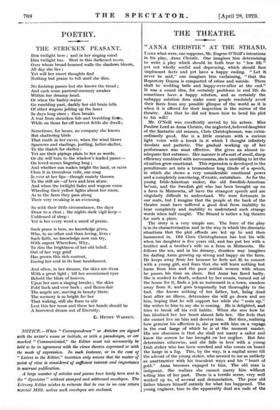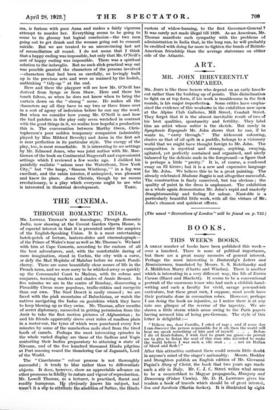THE THEATRE.
"ANNA CHRISTIE" AT THE STRAND,
I LIKE what were, one supposes, Mr. Eugene O'Neill's intentions in his play, Anna Christie. One imagines him determining to write a play which should be both true to " low life " yet not wholly sordid and depressing, which should face unpleasant facts and yet have a happy ending. " Let it never be said," one imagines him exclaiming, " that the Repertory Drama is compacted of crime and suicide. There shall be wedding bells and happy-ever-after at the end." It was a sound idea, for certainly problems in real life do sometimes have a happy solution, and as certainly the unhappy solution does make some people resolutely avert their faces from any possible glimpse of the world as it is when it is offered for their inspection in the mirror of the theatre. Alas that he did not know how to bend his plot to his will!
Mr. O'Neill was excellently served by his actors. Miss Pauline Lord as Anna Christie, the neglected, beloved daughter of the fantastic old seaman, Chris Christopherson, was extra- ordinarily good. She is a little creature with a curious light voice with a break in it which I thought infinitely desolate and pathetic. The gradual working up of her performance was most effective. She gives an almost in- adequate first entrance. Her manner is of a sort of small, sharp efficiency combined with nervousness, she is unwilling to let the situation grow emotional. This repression is developed in the penultimate act into a tremendous long tirade of a speech, in which she shows a very considerable emotional power and a completely convincing, ifexotic, naturalism. As for the yoling Irish-American stoker, the old Swedish-American bo'sun, and the Swedish girl who has been brought up on a farm in Minnesota, all have the strangest speech and are singularly difficult to understand. We were fortunate in our seats, but I imagine that the people at the back of the theatre must have suffered a good deal from inability to hear completely and inability to understand such strange words when half caught. The Strand is rather a big theatre for such a piece.
The story is a very simple one. The force of the play is in its characterization and in the way in which the dramatic situations that the plot affords are led up to and then hammered in. Old Chris Christopherson has lost his wife when his daughter is five years old, and has put her with a brother and a brother's wife on a farm in Minnesota. He follows the sea, and in his dreamy, drunken way imagines his darling Anna growing up strong and happy on the farm. He keeps away from her because he feels not fit to consort with a young girl, and fears that she will learn nothing but harm from him and the poor sottish women with whom he passes his time on shore. But Anna has fared badly. She is worked to death, seduced by her cousin, turned out of the house for it, finds a job as nursemaid in a town, wanders away from it, and goes temporarily but thoroughly to the bad. She knows nothing of her father, but, being dead beat after an illness, determines she will go down and see him, hoping that he will support her while she " rests up." She writes to him to say she is coming. He is delighted, and tries to break off his evil habits. When she sees how he has idealized her her heart almost fails her. She feels that she cannot live on him and deceive him. But then, realizing how genuine his- affection is, she goes with him on a _voyage in the coal barge of which he is at the moment master. His one obsession is that she shall not marry a sailor and know the sorrow he has brought on her mojher. But fate determines otherwise, and she falls in love with a young Irish stoker who has been wrecked and who comes on board the barge in a fog. This, by the way, is a capital scene till the advent of the young stoker, who seemed to me as unlikely as unattractive with his truculent ways and his " heart of gold." Anna becomes engaged to him. The old man is indignant. She realizes she cannot marry him without telling him of her past. There is a terrific scene, very well worked up to, of avowal and denunciation. The poor old father blames himself entirely for what has happened. The young engineer, true to the apparently dual sex code of the
sea, is furious with poor Anna and makes a fairly vigorous attempt to murder her. Everything seems to be going to come to its gloomy but logical conclusion—the two men going out to get drunk and the woman going out to commit suicide. But we are treated to an unconvincing last act of reconciliation all round. I do not mean that I think that a happy ending was impossible, but only that Mr. O'Neill's sort of happy ending was impossible. 'there was a spiritual solution to the imbroglio. But no such slick practical way out was possible granted the characters of the persons involved —characters that had been so carefully, so lovingly built up in the previous acts and were so maimed by the foolish, unthinking " tidy-up " at the end.
Here and there the playgoer will see how Mr. O'Neill has derived from Synge or from Shaw. Here and there his touch falters, as when he does not know when to bring the curtain down on the " strong " scene. He makes all the characters say all they have to say two or three times over in a sort of agony of indecision before he can say the word. But when we consider how young Mr. O'Neill is and how the bad patches in the play only seem wretched in contrast with the good things in it, we realize how hopeful a production this is. The conversation between Marthy Owen, Chris- topherson's poor sodden temporary companion (admirably played by Miss Mildred Beverly) and Anna in the first act is near perfection in its particular style. The energy of the play, too, is most remarkable. It is interesting to see settings by Mr. Edmond Jones, who was joint author with Mr. Mac- Gowan of the book on Continental Stagecraft and expressionist settings which I reviewed a few weeks ago. I disliked his painfully realistic " saloon near the Waterfront, New York City," but "the barge, Simeon Winthrop," in a fog was excellent, and the cabin interior, if uninspired, was pleasant and knew its place. Anna Christie, though by no means revolutionary, is a play which everyone ought to see who is interested in theatrical development. Term.



















































 Previous page
Previous page